Sustainability in Oil and Gas Sector: Analysis of Nigerian Issues
VerifiedAdded on 2022/08/12
|11
|2596
|20
Report
AI Summary
This report provides an overview of the sustainability challenges within Nigeria's oil and gas sector. It begins by emphasizing the importance of sustainability, particularly concerning environmental quality, economic growth, and public health. The study aims to understand the current sustainability problems in Nigeria's oil and gas sector, identifying issues such as environmental pollution from wastewater, emissions, and refining processes. The report explores existing literature, focusing on supply chain management, government policies, and the role of sustainability in the Arctic oil and gas industry. The theoretical framework highlights the negative impacts of oil and gas development on the environment and society, emphasizing the need for sustainable supply chain management and the importance of early risk identification. The report then applies these theories to the Nigerian context, noting the country's significant oil and gas reserves and the need for sustainable practices to mitigate environmental damage and ensure better living conditions. The dissertation aims to identify barriers to sustainability in the oil and gas sector, providing insights for future research and strategies for achieving sustainability in this critical industry. The report references various studies on related topics.
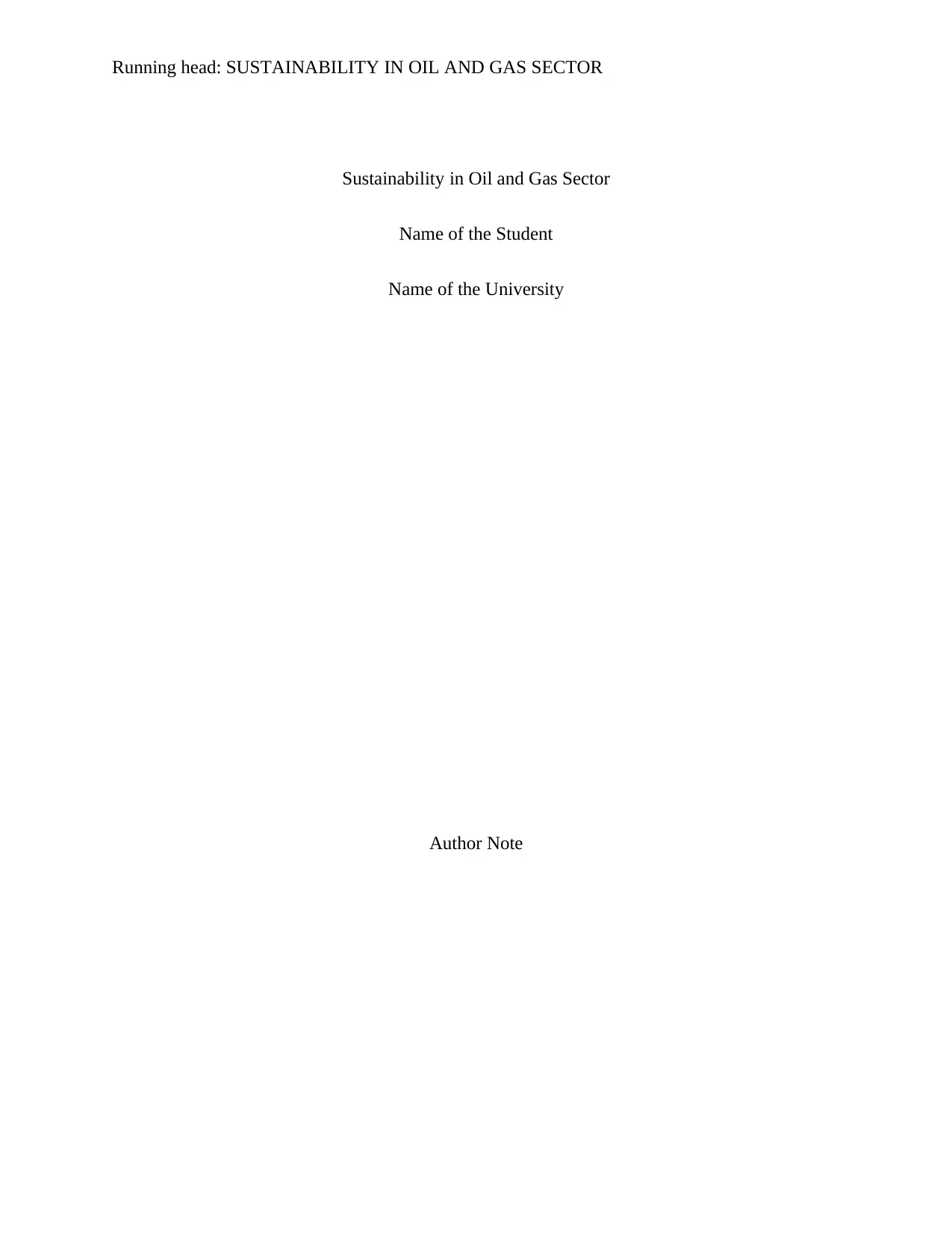
Running head: SUSTAINABILITY IN OIL AND GAS SECTOR
Sustainability in Oil and Gas Sector
Name of the Student
Name of the University
Author Note
Sustainability in Oil and Gas Sector
Name of the Student
Name of the University
Author Note
Paraphrase This Document
Need a fresh take? Get an instant paraphrase of this document with our AI Paraphraser
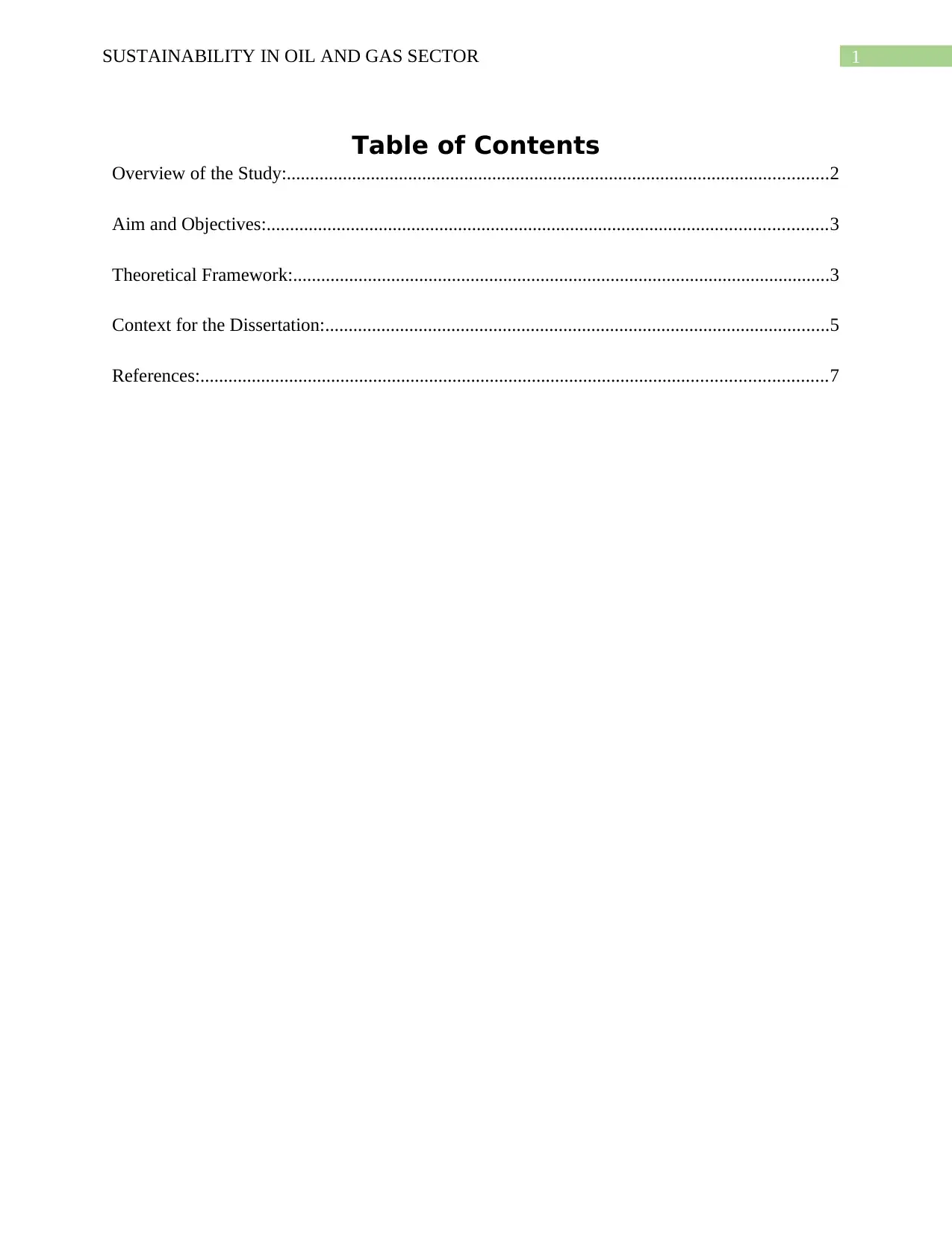
1SUSTAINABILITY IN OIL AND GAS SECTOR
Table of Contents
Overview of the Study:....................................................................................................................2
Aim and Objectives:........................................................................................................................3
Theoretical Framework:...................................................................................................................3
Context for the Dissertation:............................................................................................................5
References:......................................................................................................................................7
Table of Contents
Overview of the Study:....................................................................................................................2
Aim and Objectives:........................................................................................................................3
Theoretical Framework:...................................................................................................................3
Context for the Dissertation:............................................................................................................5
References:......................................................................................................................................7
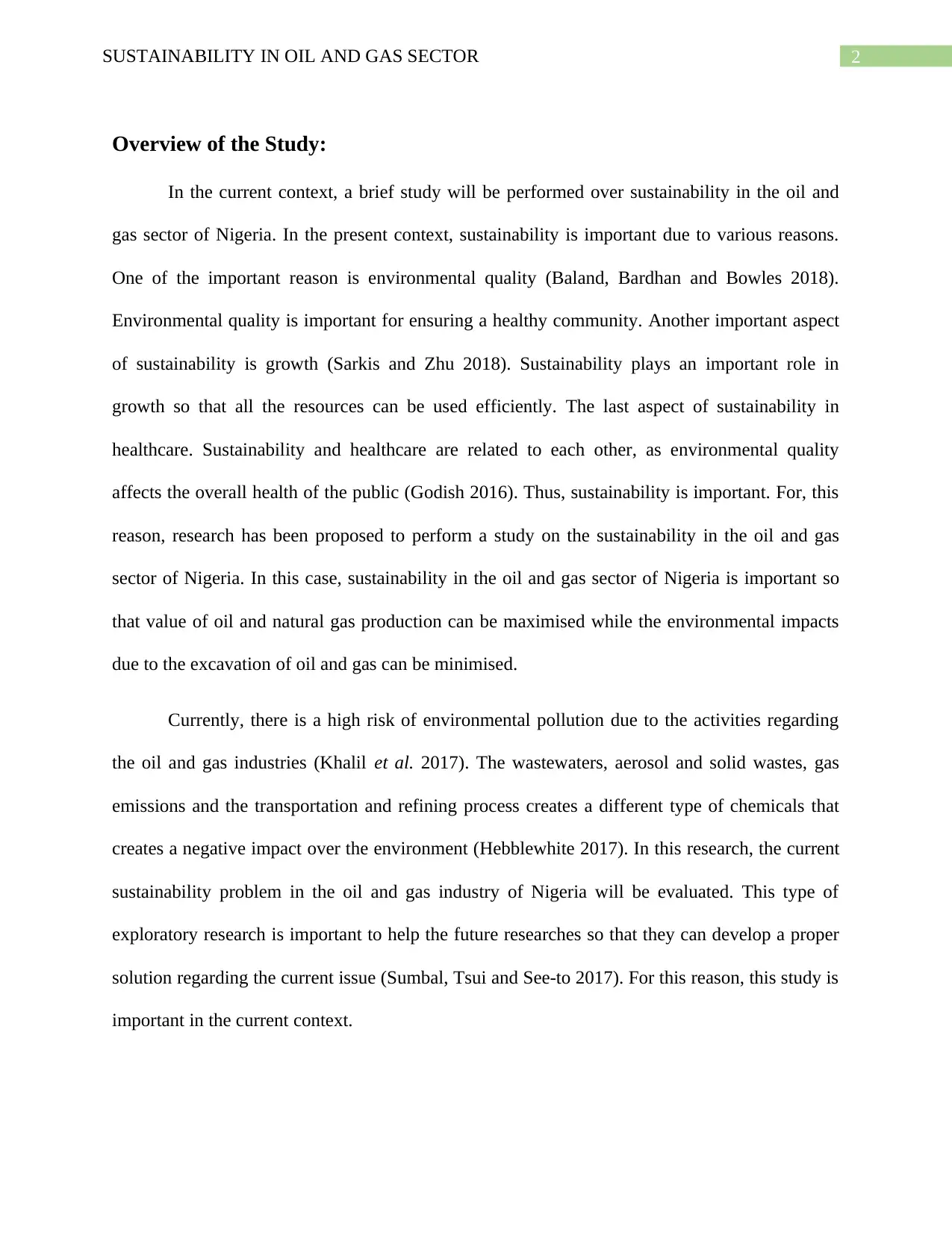
2SUSTAINABILITY IN OIL AND GAS SECTOR
Overview of the Study:
In the current context, a brief study will be performed over sustainability in the oil and
gas sector of Nigeria. In the present context, sustainability is important due to various reasons.
One of the important reason is environmental quality (Baland, Bardhan and Bowles 2018).
Environmental quality is important for ensuring a healthy community. Another important aspect
of sustainability is growth (Sarkis and Zhu 2018). Sustainability plays an important role in
growth so that all the resources can be used efficiently. The last aspect of sustainability in
healthcare. Sustainability and healthcare are related to each other, as environmental quality
affects the overall health of the public (Godish 2016). Thus, sustainability is important. For, this
reason, research has been proposed to perform a study on the sustainability in the oil and gas
sector of Nigeria. In this case, sustainability in the oil and gas sector of Nigeria is important so
that value of oil and natural gas production can be maximised while the environmental impacts
due to the excavation of oil and gas can be minimised.
Currently, there is a high risk of environmental pollution due to the activities regarding
the oil and gas industries (Khalil et al. 2017). The wastewaters, aerosol and solid wastes, gas
emissions and the transportation and refining process creates a different type of chemicals that
creates a negative impact over the environment (Hebblewhite 2017). In this research, the current
sustainability problem in the oil and gas industry of Nigeria will be evaluated. This type of
exploratory research is important to help the future researches so that they can develop a proper
solution regarding the current issue (Sumbal, Tsui and See-to 2017). For this reason, this study is
important in the current context.
Overview of the Study:
In the current context, a brief study will be performed over sustainability in the oil and
gas sector of Nigeria. In the present context, sustainability is important due to various reasons.
One of the important reason is environmental quality (Baland, Bardhan and Bowles 2018).
Environmental quality is important for ensuring a healthy community. Another important aspect
of sustainability is growth (Sarkis and Zhu 2018). Sustainability plays an important role in
growth so that all the resources can be used efficiently. The last aspect of sustainability in
healthcare. Sustainability and healthcare are related to each other, as environmental quality
affects the overall health of the public (Godish 2016). Thus, sustainability is important. For, this
reason, research has been proposed to perform a study on the sustainability in the oil and gas
sector of Nigeria. In this case, sustainability in the oil and gas sector of Nigeria is important so
that value of oil and natural gas production can be maximised while the environmental impacts
due to the excavation of oil and gas can be minimised.
Currently, there is a high risk of environmental pollution due to the activities regarding
the oil and gas industries (Khalil et al. 2017). The wastewaters, aerosol and solid wastes, gas
emissions and the transportation and refining process creates a different type of chemicals that
creates a negative impact over the environment (Hebblewhite 2017). In this research, the current
sustainability problem in the oil and gas industry of Nigeria will be evaluated. This type of
exploratory research is important to help the future researches so that they can develop a proper
solution regarding the current issue (Sumbal, Tsui and See-to 2017). For this reason, this study is
important in the current context.
⊘ This is a preview!⊘
Do you want full access?
Subscribe today to unlock all pages.

Trusted by 1+ million students worldwide
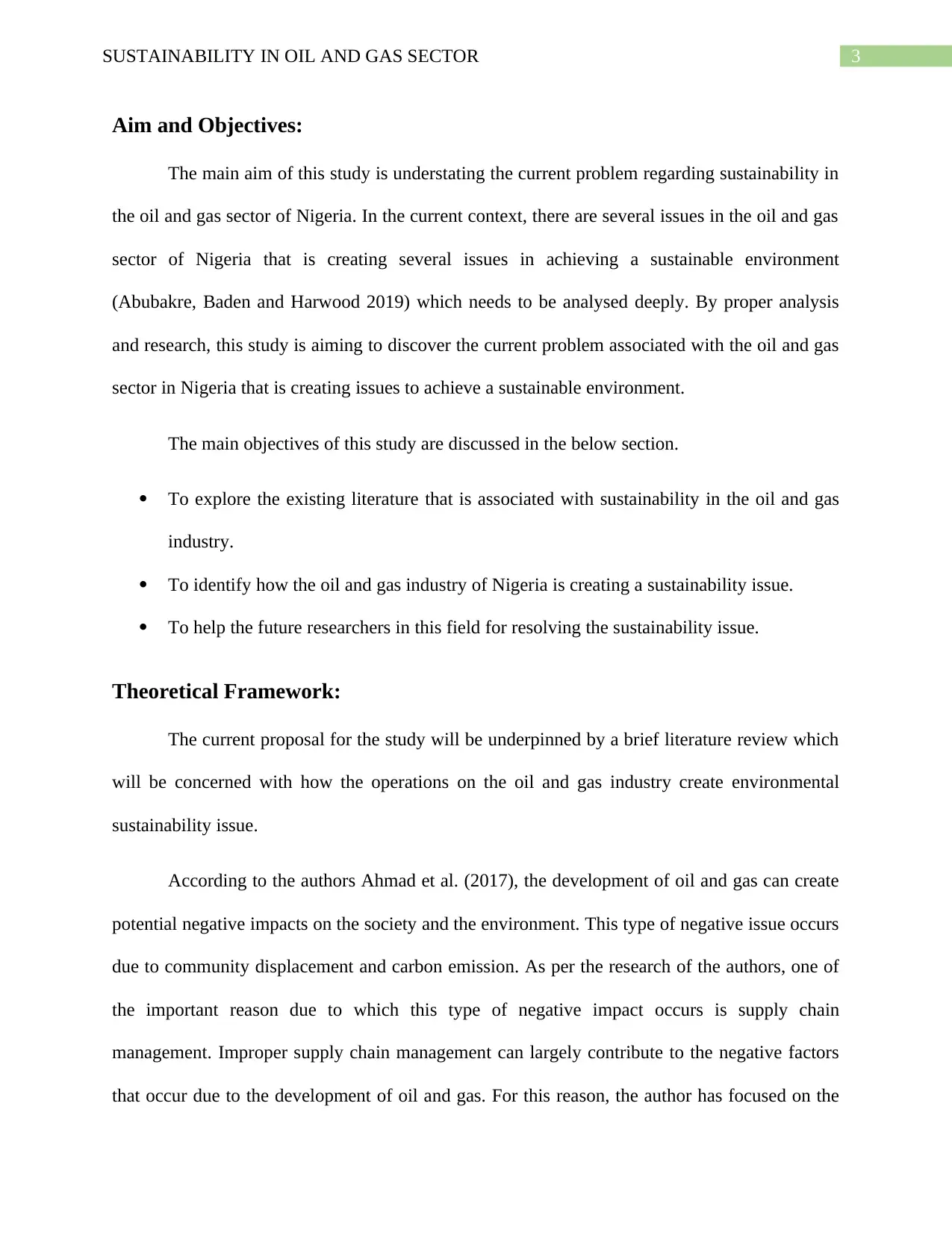
3SUSTAINABILITY IN OIL AND GAS SECTOR
Aim and Objectives:
The main aim of this study is understating the current problem regarding sustainability in
the oil and gas sector of Nigeria. In the current context, there are several issues in the oil and gas
sector of Nigeria that is creating several issues in achieving a sustainable environment
(Abubakre, Baden and Harwood 2019) which needs to be analysed deeply. By proper analysis
and research, this study is aiming to discover the current problem associated with the oil and gas
sector in Nigeria that is creating issues to achieve a sustainable environment.
The main objectives of this study are discussed in the below section.
To explore the existing literature that is associated with sustainability in the oil and gas
industry.
To identify how the oil and gas industry of Nigeria is creating a sustainability issue.
To help the future researchers in this field for resolving the sustainability issue.
Theoretical Framework:
The current proposal for the study will be underpinned by a brief literature review which
will be concerned with how the operations on the oil and gas industry create environmental
sustainability issue.
According to the authors Ahmad et al. (2017), the development of oil and gas can create
potential negative impacts on the society and the environment. This type of negative issue occurs
due to community displacement and carbon emission. As per the research of the authors, one of
the important reason due to which this type of negative impact occurs is supply chain
management. Improper supply chain management can largely contribute to the negative factors
that occur due to the development of oil and gas. For this reason, the author has focused on the
Aim and Objectives:
The main aim of this study is understating the current problem regarding sustainability in
the oil and gas sector of Nigeria. In the current context, there are several issues in the oil and gas
sector of Nigeria that is creating several issues in achieving a sustainable environment
(Abubakre, Baden and Harwood 2019) which needs to be analysed deeply. By proper analysis
and research, this study is aiming to discover the current problem associated with the oil and gas
sector in Nigeria that is creating issues to achieve a sustainable environment.
The main objectives of this study are discussed in the below section.
To explore the existing literature that is associated with sustainability in the oil and gas
industry.
To identify how the oil and gas industry of Nigeria is creating a sustainability issue.
To help the future researchers in this field for resolving the sustainability issue.
Theoretical Framework:
The current proposal for the study will be underpinned by a brief literature review which
will be concerned with how the operations on the oil and gas industry create environmental
sustainability issue.
According to the authors Ahmad et al. (2017), the development of oil and gas can create
potential negative impacts on the society and the environment. This type of negative issue occurs
due to community displacement and carbon emission. As per the research of the authors, one of
the important reason due to which this type of negative impact occurs is supply chain
management. Improper supply chain management can largely contribute to the negative factors
that occur due to the development of oil and gas. For this reason, the author has focused on the
Paraphrase This Document
Need a fresh take? Get an instant paraphrase of this document with our AI Paraphraser
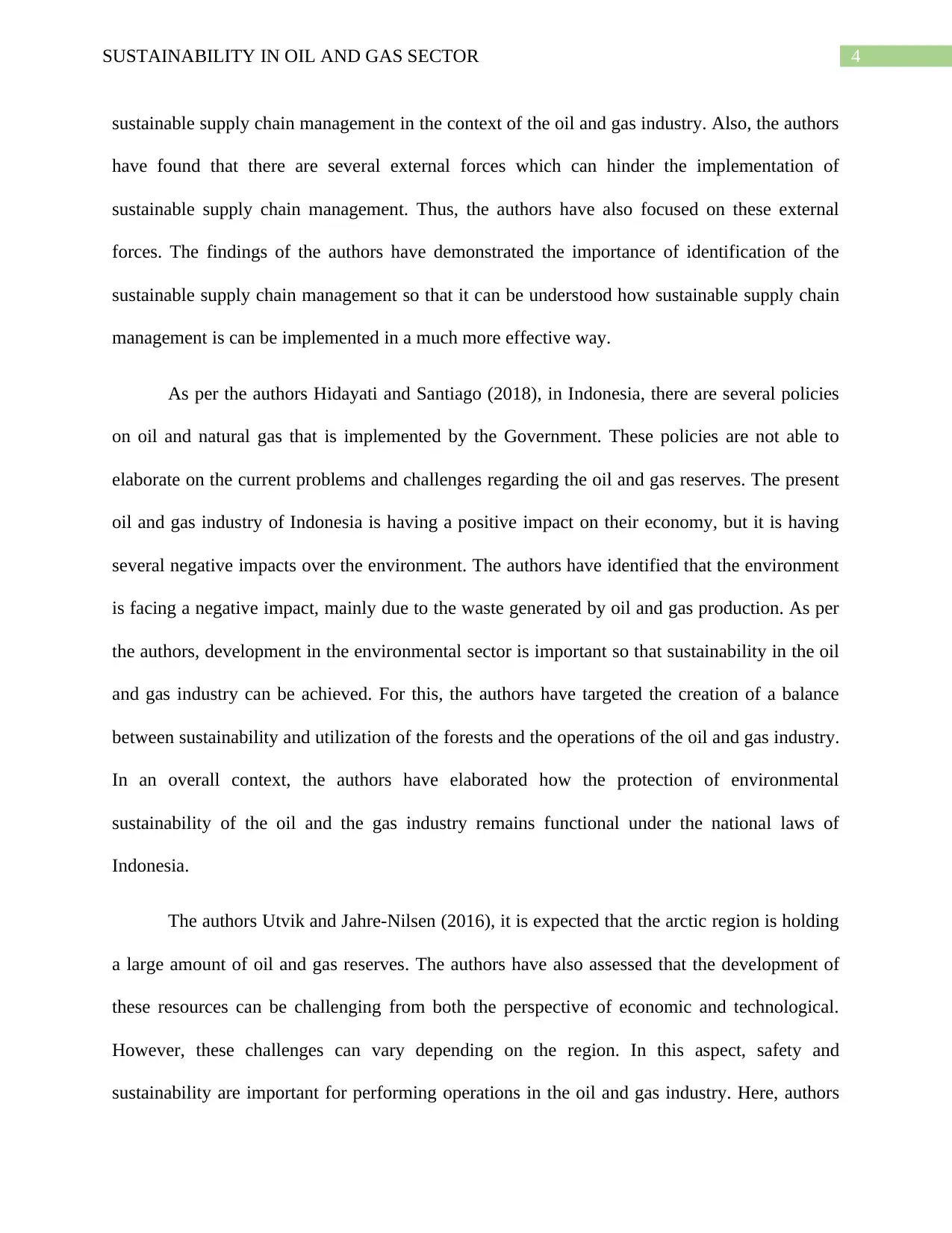
4SUSTAINABILITY IN OIL AND GAS SECTOR
sustainable supply chain management in the context of the oil and gas industry. Also, the authors
have found that there are several external forces which can hinder the implementation of
sustainable supply chain management. Thus, the authors have also focused on these external
forces. The findings of the authors have demonstrated the importance of identification of the
sustainable supply chain management so that it can be understood how sustainable supply chain
management is can be implemented in a much more effective way.
As per the authors Hidayati and Santiago (2018), in Indonesia, there are several policies
on oil and natural gas that is implemented by the Government. These policies are not able to
elaborate on the current problems and challenges regarding the oil and gas reserves. The present
oil and gas industry of Indonesia is having a positive impact on their economy, but it is having
several negative impacts over the environment. The authors have identified that the environment
is facing a negative impact, mainly due to the waste generated by oil and gas production. As per
the authors, development in the environmental sector is important so that sustainability in the oil
and gas industry can be achieved. For this, the authors have targeted the creation of a balance
between sustainability and utilization of the forests and the operations of the oil and gas industry.
In an overall context, the authors have elaborated how the protection of environmental
sustainability of the oil and the gas industry remains functional under the national laws of
Indonesia.
The authors Utvik and Jahre-Nilsen (2016), it is expected that the arctic region is holding
a large amount of oil and gas reserves. The authors have also assessed that the development of
these resources can be challenging from both the perspective of economic and technological.
However, these challenges can vary depending on the region. In this aspect, safety and
sustainability are important for performing operations in the oil and gas industry. Here, authors
sustainable supply chain management in the context of the oil and gas industry. Also, the authors
have found that there are several external forces which can hinder the implementation of
sustainable supply chain management. Thus, the authors have also focused on these external
forces. The findings of the authors have demonstrated the importance of identification of the
sustainable supply chain management so that it can be understood how sustainable supply chain
management is can be implemented in a much more effective way.
As per the authors Hidayati and Santiago (2018), in Indonesia, there are several policies
on oil and natural gas that is implemented by the Government. These policies are not able to
elaborate on the current problems and challenges regarding the oil and gas reserves. The present
oil and gas industry of Indonesia is having a positive impact on their economy, but it is having
several negative impacts over the environment. The authors have identified that the environment
is facing a negative impact, mainly due to the waste generated by oil and gas production. As per
the authors, development in the environmental sector is important so that sustainability in the oil
and gas industry can be achieved. For this, the authors have targeted the creation of a balance
between sustainability and utilization of the forests and the operations of the oil and gas industry.
In an overall context, the authors have elaborated how the protection of environmental
sustainability of the oil and the gas industry remains functional under the national laws of
Indonesia.
The authors Utvik and Jahre-Nilsen (2016), it is expected that the arctic region is holding
a large amount of oil and gas reserves. The authors have also assessed that the development of
these resources can be challenging from both the perspective of economic and technological.
However, these challenges can vary depending on the region. In this aspect, safety and
sustainability are important for performing operations in the oil and gas industry. Here, authors
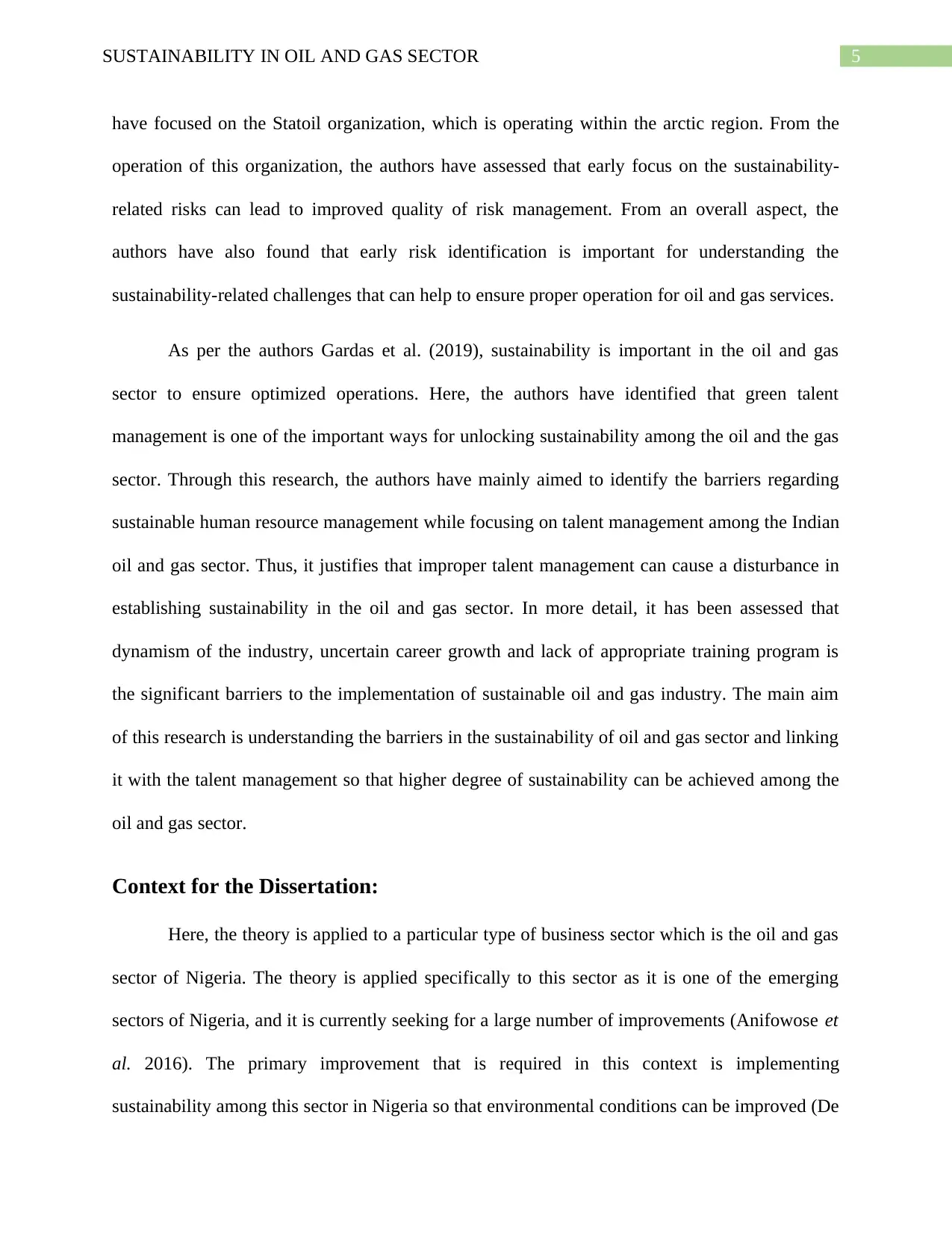
5SUSTAINABILITY IN OIL AND GAS SECTOR
have focused on the Statoil organization, which is operating within the arctic region. From the
operation of this organization, the authors have assessed that early focus on the sustainability-
related risks can lead to improved quality of risk management. From an overall aspect, the
authors have also found that early risk identification is important for understanding the
sustainability-related challenges that can help to ensure proper operation for oil and gas services.
As per the authors Gardas et al. (2019), sustainability is important in the oil and gas
sector to ensure optimized operations. Here, the authors have identified that green talent
management is one of the important ways for unlocking sustainability among the oil and the gas
sector. Through this research, the authors have mainly aimed to identify the barriers regarding
sustainable human resource management while focusing on talent management among the Indian
oil and gas sector. Thus, it justifies that improper talent management can cause a disturbance in
establishing sustainability in the oil and gas sector. In more detail, it has been assessed that
dynamism of the industry, uncertain career growth and lack of appropriate training program is
the significant barriers to the implementation of sustainable oil and gas industry. The main aim
of this research is understanding the barriers in the sustainability of oil and gas sector and linking
it with the talent management so that higher degree of sustainability can be achieved among the
oil and gas sector.
Context for the Dissertation:
Here, the theory is applied to a particular type of business sector which is the oil and gas
sector of Nigeria. The theory is applied specifically to this sector as it is one of the emerging
sectors of Nigeria, and it is currently seeking for a large number of improvements (Anifowose et
al. 2016). The primary improvement that is required in this context is implementing
sustainability among this sector in Nigeria so that environmental conditions can be improved (De
have focused on the Statoil organization, which is operating within the arctic region. From the
operation of this organization, the authors have assessed that early focus on the sustainability-
related risks can lead to improved quality of risk management. From an overall aspect, the
authors have also found that early risk identification is important for understanding the
sustainability-related challenges that can help to ensure proper operation for oil and gas services.
As per the authors Gardas et al. (2019), sustainability is important in the oil and gas
sector to ensure optimized operations. Here, the authors have identified that green talent
management is one of the important ways for unlocking sustainability among the oil and the gas
sector. Through this research, the authors have mainly aimed to identify the barriers regarding
sustainable human resource management while focusing on talent management among the Indian
oil and gas sector. Thus, it justifies that improper talent management can cause a disturbance in
establishing sustainability in the oil and gas sector. In more detail, it has been assessed that
dynamism of the industry, uncertain career growth and lack of appropriate training program is
the significant barriers to the implementation of sustainable oil and gas industry. The main aim
of this research is understanding the barriers in the sustainability of oil and gas sector and linking
it with the talent management so that higher degree of sustainability can be achieved among the
oil and gas sector.
Context for the Dissertation:
Here, the theory is applied to a particular type of business sector which is the oil and gas
sector of Nigeria. The theory is applied specifically to this sector as it is one of the emerging
sectors of Nigeria, and it is currently seeking for a large number of improvements (Anifowose et
al. 2016). The primary improvement that is required in this context is implementing
sustainability among this sector in Nigeria so that environmental conditions can be improved (De
⊘ This is a preview!⊘
Do you want full access?
Subscribe today to unlock all pages.

Trusted by 1+ million students worldwide
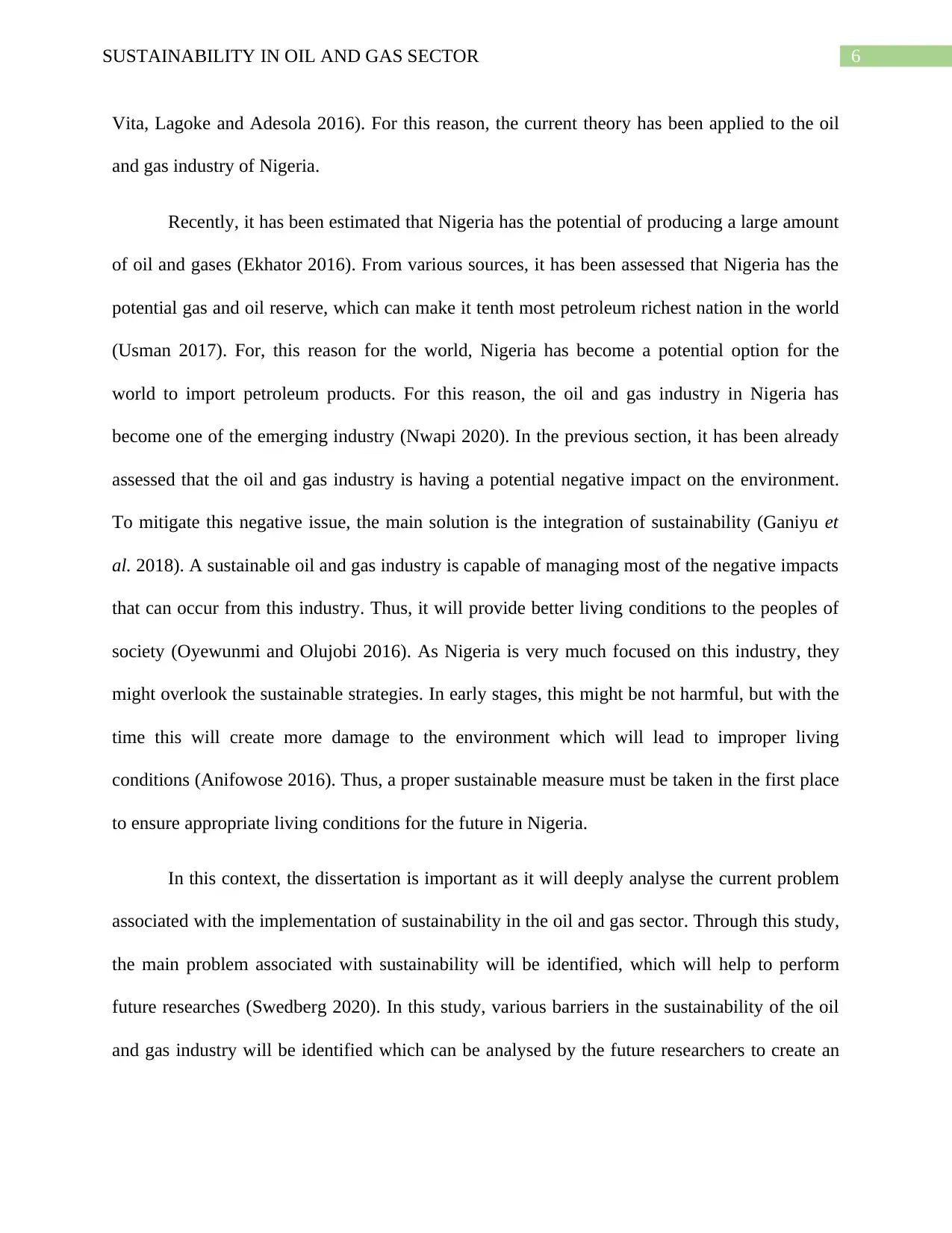
6SUSTAINABILITY IN OIL AND GAS SECTOR
Vita, Lagoke and Adesola 2016). For this reason, the current theory has been applied to the oil
and gas industry of Nigeria.
Recently, it has been estimated that Nigeria has the potential of producing a large amount
of oil and gases (Ekhator 2016). From various sources, it has been assessed that Nigeria has the
potential gas and oil reserve, which can make it tenth most petroleum richest nation in the world
(Usman 2017). For, this reason for the world, Nigeria has become a potential option for the
world to import petroleum products. For this reason, the oil and gas industry in Nigeria has
become one of the emerging industry (Nwapi 2020). In the previous section, it has been already
assessed that the oil and gas industry is having a potential negative impact on the environment.
To mitigate this negative issue, the main solution is the integration of sustainability (Ganiyu et
al. 2018). A sustainable oil and gas industry is capable of managing most of the negative impacts
that can occur from this industry. Thus, it will provide better living conditions to the peoples of
society (Oyewunmi and Olujobi 2016). As Nigeria is very much focused on this industry, they
might overlook the sustainable strategies. In early stages, this might be not harmful, but with the
time this will create more damage to the environment which will lead to improper living
conditions (Anifowose 2016). Thus, a proper sustainable measure must be taken in the first place
to ensure appropriate living conditions for the future in Nigeria.
In this context, the dissertation is important as it will deeply analyse the current problem
associated with the implementation of sustainability in the oil and gas sector. Through this study,
the main problem associated with sustainability will be identified, which will help to perform
future researches (Swedberg 2020). In this study, various barriers in the sustainability of the oil
and gas industry will be identified which can be analysed by the future researchers to create an
Vita, Lagoke and Adesola 2016). For this reason, the current theory has been applied to the oil
and gas industry of Nigeria.
Recently, it has been estimated that Nigeria has the potential of producing a large amount
of oil and gases (Ekhator 2016). From various sources, it has been assessed that Nigeria has the
potential gas and oil reserve, which can make it tenth most petroleum richest nation in the world
(Usman 2017). For, this reason for the world, Nigeria has become a potential option for the
world to import petroleum products. For this reason, the oil and gas industry in Nigeria has
become one of the emerging industry (Nwapi 2020). In the previous section, it has been already
assessed that the oil and gas industry is having a potential negative impact on the environment.
To mitigate this negative issue, the main solution is the integration of sustainability (Ganiyu et
al. 2018). A sustainable oil and gas industry is capable of managing most of the negative impacts
that can occur from this industry. Thus, it will provide better living conditions to the peoples of
society (Oyewunmi and Olujobi 2016). As Nigeria is very much focused on this industry, they
might overlook the sustainable strategies. In early stages, this might be not harmful, but with the
time this will create more damage to the environment which will lead to improper living
conditions (Anifowose 2016). Thus, a proper sustainable measure must be taken in the first place
to ensure appropriate living conditions for the future in Nigeria.
In this context, the dissertation is important as it will deeply analyse the current problem
associated with the implementation of sustainability in the oil and gas sector. Through this study,
the main problem associated with sustainability will be identified, which will help to perform
future researches (Swedberg 2020). In this study, various barriers in the sustainability of the oil
and gas industry will be identified which can be analysed by the future researchers to create an
Paraphrase This Document
Need a fresh take? Get an instant paraphrase of this document with our AI Paraphraser
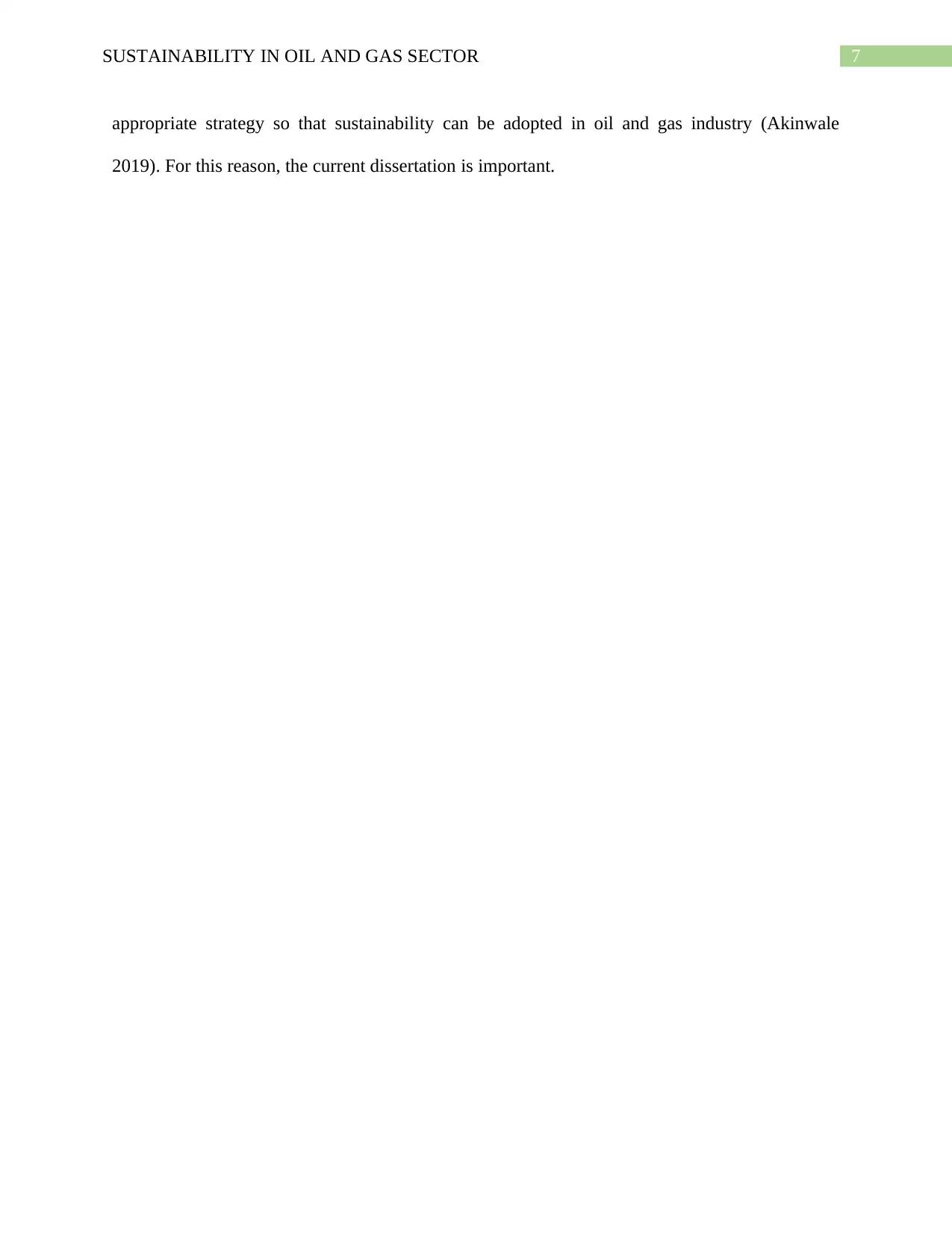
7SUSTAINABILITY IN OIL AND GAS SECTOR
appropriate strategy so that sustainability can be adopted in oil and gas industry (Akinwale
2019). For this reason, the current dissertation is important.
appropriate strategy so that sustainability can be adopted in oil and gas industry (Akinwale
2019). For this reason, the current dissertation is important.
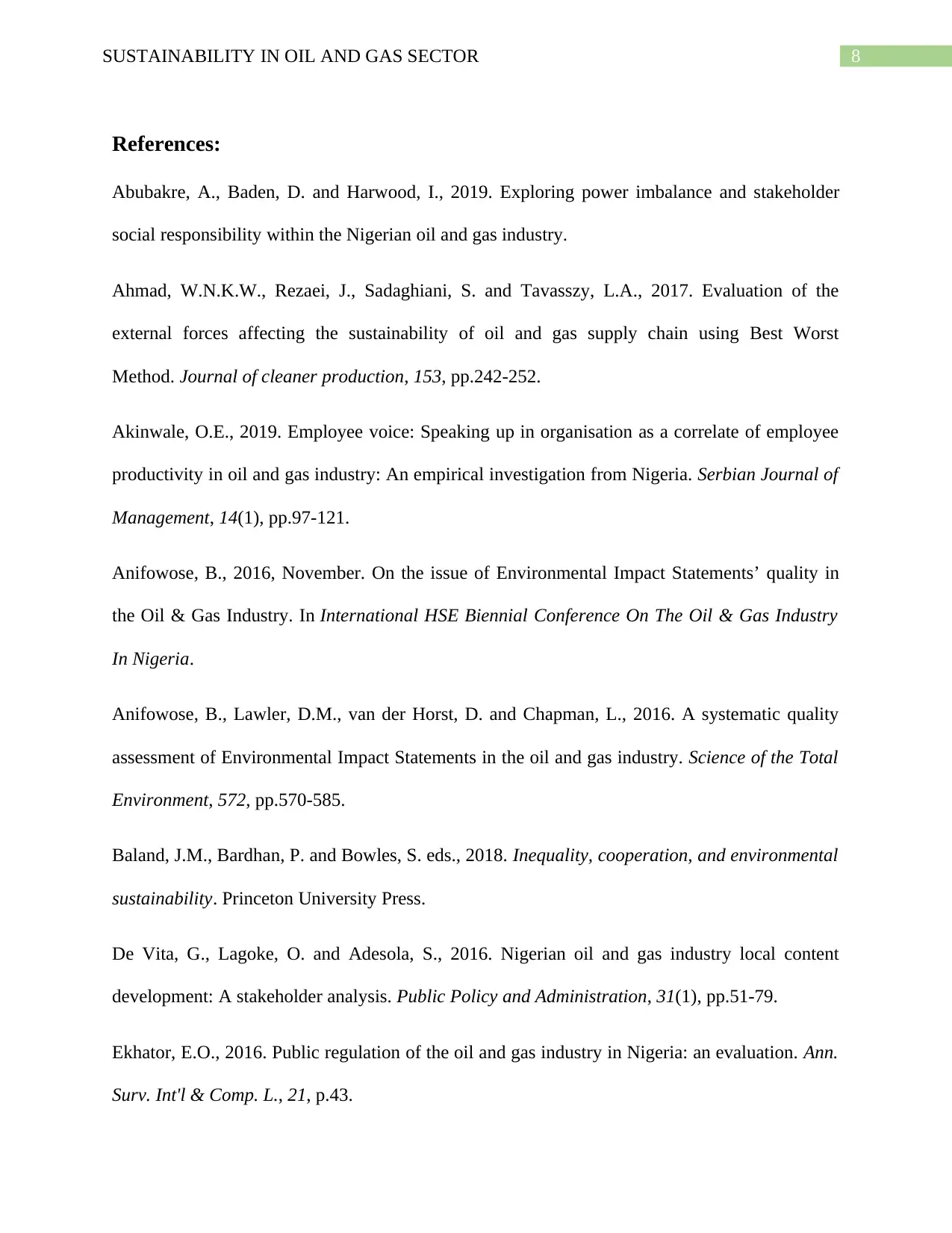
8SUSTAINABILITY IN OIL AND GAS SECTOR
References:
Abubakre, A., Baden, D. and Harwood, I., 2019. Exploring power imbalance and stakeholder
social responsibility within the Nigerian oil and gas industry.
Ahmad, W.N.K.W., Rezaei, J., Sadaghiani, S. and Tavasszy, L.A., 2017. Evaluation of the
external forces affecting the sustainability of oil and gas supply chain using Best Worst
Method. Journal of cleaner production, 153, pp.242-252.
Akinwale, O.E., 2019. Employee voice: Speaking up in organisation as a correlate of employee
productivity in oil and gas industry: An empirical investigation from Nigeria. Serbian Journal of
Management, 14(1), pp.97-121.
Anifowose, B., 2016, November. On the issue of Environmental Impact Statements’ quality in
the Oil & Gas Industry. In International HSE Biennial Conference On The Oil & Gas Industry
In Nigeria.
Anifowose, B., Lawler, D.M., van der Horst, D. and Chapman, L., 2016. A systematic quality
assessment of Environmental Impact Statements in the oil and gas industry. Science of the Total
Environment, 572, pp.570-585.
Baland, J.M., Bardhan, P. and Bowles, S. eds., 2018. Inequality, cooperation, and environmental
sustainability. Princeton University Press.
De Vita, G., Lagoke, O. and Adesola, S., 2016. Nigerian oil and gas industry local content
development: A stakeholder analysis. Public Policy and Administration, 31(1), pp.51-79.
Ekhator, E.O., 2016. Public regulation of the oil and gas industry in Nigeria: an evaluation. Ann.
Surv. Int'l & Comp. L., 21, p.43.
References:
Abubakre, A., Baden, D. and Harwood, I., 2019. Exploring power imbalance and stakeholder
social responsibility within the Nigerian oil and gas industry.
Ahmad, W.N.K.W., Rezaei, J., Sadaghiani, S. and Tavasszy, L.A., 2017. Evaluation of the
external forces affecting the sustainability of oil and gas supply chain using Best Worst
Method. Journal of cleaner production, 153, pp.242-252.
Akinwale, O.E., 2019. Employee voice: Speaking up in organisation as a correlate of employee
productivity in oil and gas industry: An empirical investigation from Nigeria. Serbian Journal of
Management, 14(1), pp.97-121.
Anifowose, B., 2016, November. On the issue of Environmental Impact Statements’ quality in
the Oil & Gas Industry. In International HSE Biennial Conference On The Oil & Gas Industry
In Nigeria.
Anifowose, B., Lawler, D.M., van der Horst, D. and Chapman, L., 2016. A systematic quality
assessment of Environmental Impact Statements in the oil and gas industry. Science of the Total
Environment, 572, pp.570-585.
Baland, J.M., Bardhan, P. and Bowles, S. eds., 2018. Inequality, cooperation, and environmental
sustainability. Princeton University Press.
De Vita, G., Lagoke, O. and Adesola, S., 2016. Nigerian oil and gas industry local content
development: A stakeholder analysis. Public Policy and Administration, 31(1), pp.51-79.
Ekhator, E.O., 2016. Public regulation of the oil and gas industry in Nigeria: an evaluation. Ann.
Surv. Int'l & Comp. L., 21, p.43.
⊘ This is a preview!⊘
Do you want full access?
Subscribe today to unlock all pages.

Trusted by 1+ million students worldwide
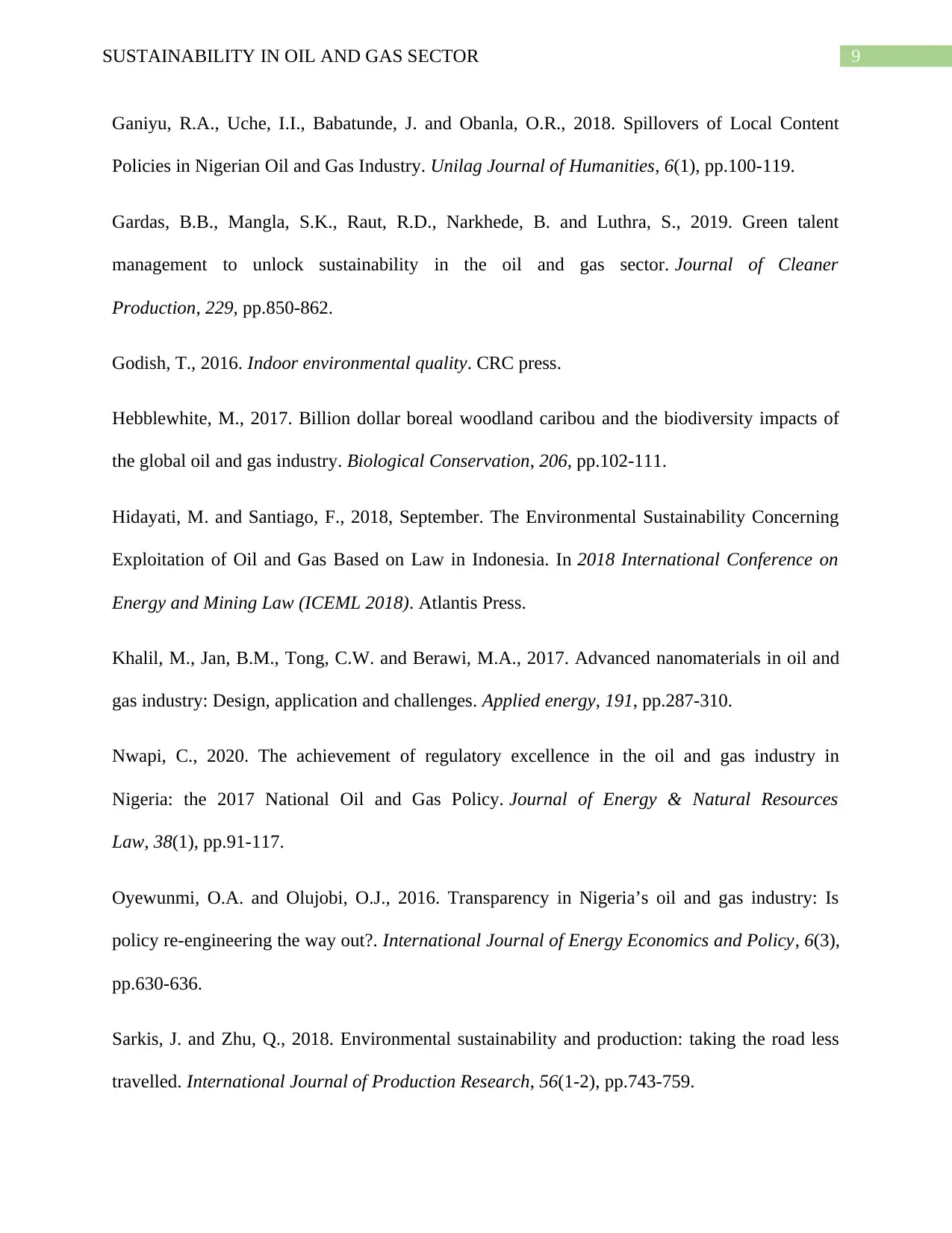
9SUSTAINABILITY IN OIL AND GAS SECTOR
Ganiyu, R.A., Uche, I.I., Babatunde, J. and Obanla, O.R., 2018. Spillovers of Local Content
Policies in Nigerian Oil and Gas Industry. Unilag Journal of Humanities, 6(1), pp.100-119.
Gardas, B.B., Mangla, S.K., Raut, R.D., Narkhede, B. and Luthra, S., 2019. Green talent
management to unlock sustainability in the oil and gas sector. Journal of Cleaner
Production, 229, pp.850-862.
Godish, T., 2016. Indoor environmental quality. CRC press.
Hebblewhite, M., 2017. Billion dollar boreal woodland caribou and the biodiversity impacts of
the global oil and gas industry. Biological Conservation, 206, pp.102-111.
Hidayati, M. and Santiago, F., 2018, September. The Environmental Sustainability Concerning
Exploitation of Oil and Gas Based on Law in Indonesia. In 2018 International Conference on
Energy and Mining Law (ICEML 2018). Atlantis Press.
Khalil, M., Jan, B.M., Tong, C.W. and Berawi, M.A., 2017. Advanced nanomaterials in oil and
gas industry: Design, application and challenges. Applied energy, 191, pp.287-310.
Nwapi, C., 2020. The achievement of regulatory excellence in the oil and gas industry in
Nigeria: the 2017 National Oil and Gas Policy. Journal of Energy & Natural Resources
Law, 38(1), pp.91-117.
Oyewunmi, O.A. and Olujobi, O.J., 2016. Transparency in Nigeria’s oil and gas industry: Is
policy re-engineering the way out?. International Journal of Energy Economics and Policy, 6(3),
pp.630-636.
Sarkis, J. and Zhu, Q., 2018. Environmental sustainability and production: taking the road less
travelled. International Journal of Production Research, 56(1-2), pp.743-759.
Ganiyu, R.A., Uche, I.I., Babatunde, J. and Obanla, O.R., 2018. Spillovers of Local Content
Policies in Nigerian Oil and Gas Industry. Unilag Journal of Humanities, 6(1), pp.100-119.
Gardas, B.B., Mangla, S.K., Raut, R.D., Narkhede, B. and Luthra, S., 2019. Green talent
management to unlock sustainability in the oil and gas sector. Journal of Cleaner
Production, 229, pp.850-862.
Godish, T., 2016. Indoor environmental quality. CRC press.
Hebblewhite, M., 2017. Billion dollar boreal woodland caribou and the biodiversity impacts of
the global oil and gas industry. Biological Conservation, 206, pp.102-111.
Hidayati, M. and Santiago, F., 2018, September. The Environmental Sustainability Concerning
Exploitation of Oil and Gas Based on Law in Indonesia. In 2018 International Conference on
Energy and Mining Law (ICEML 2018). Atlantis Press.
Khalil, M., Jan, B.M., Tong, C.W. and Berawi, M.A., 2017. Advanced nanomaterials in oil and
gas industry: Design, application and challenges. Applied energy, 191, pp.287-310.
Nwapi, C., 2020. The achievement of regulatory excellence in the oil and gas industry in
Nigeria: the 2017 National Oil and Gas Policy. Journal of Energy & Natural Resources
Law, 38(1), pp.91-117.
Oyewunmi, O.A. and Olujobi, O.J., 2016. Transparency in Nigeria’s oil and gas industry: Is
policy re-engineering the way out?. International Journal of Energy Economics and Policy, 6(3),
pp.630-636.
Sarkis, J. and Zhu, Q., 2018. Environmental sustainability and production: taking the road less
travelled. International Journal of Production Research, 56(1-2), pp.743-759.
Paraphrase This Document
Need a fresh take? Get an instant paraphrase of this document with our AI Paraphraser
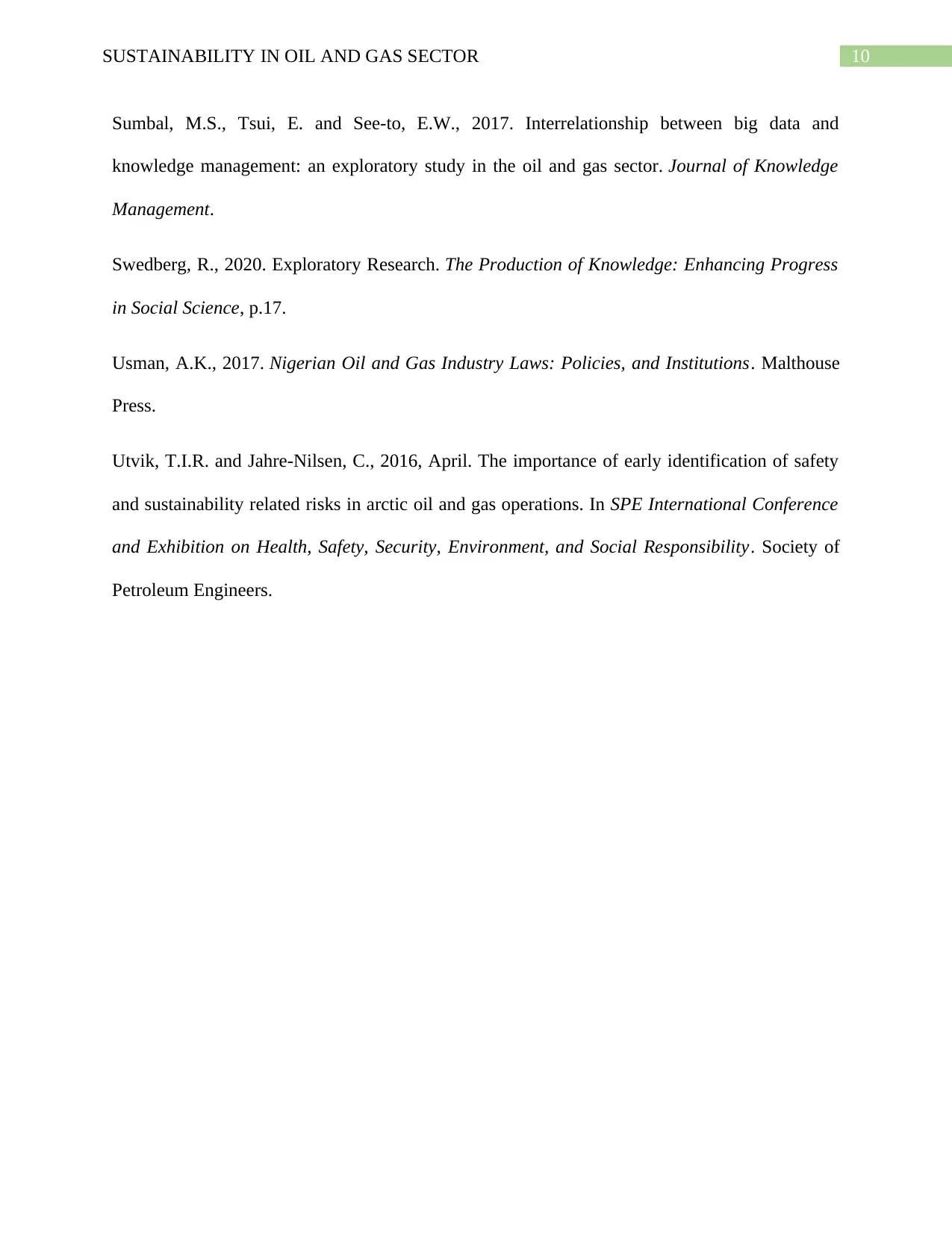
10SUSTAINABILITY IN OIL AND GAS SECTOR
Sumbal, M.S., Tsui, E. and See-to, E.W., 2017. Interrelationship between big data and
knowledge management: an exploratory study in the oil and gas sector. Journal of Knowledge
Management.
Swedberg, R., 2020. Exploratory Research. The Production of Knowledge: Enhancing Progress
in Social Science, p.17.
Usman, A.K., 2017. Nigerian Oil and Gas Industry Laws: Policies, and Institutions. Malthouse
Press.
Utvik, T.I.R. and Jahre-Nilsen, C., 2016, April. The importance of early identification of safety
and sustainability related risks in arctic oil and gas operations. In SPE International Conference
and Exhibition on Health, Safety, Security, Environment, and Social Responsibility. Society of
Petroleum Engineers.
Sumbal, M.S., Tsui, E. and See-to, E.W., 2017. Interrelationship between big data and
knowledge management: an exploratory study in the oil and gas sector. Journal of Knowledge
Management.
Swedberg, R., 2020. Exploratory Research. The Production of Knowledge: Enhancing Progress
in Social Science, p.17.
Usman, A.K., 2017. Nigerian Oil and Gas Industry Laws: Policies, and Institutions. Malthouse
Press.
Utvik, T.I.R. and Jahre-Nilsen, C., 2016, April. The importance of early identification of safety
and sustainability related risks in arctic oil and gas operations. In SPE International Conference
and Exhibition on Health, Safety, Security, Environment, and Social Responsibility. Society of
Petroleum Engineers.
1 out of 11
Related Documents
Your All-in-One AI-Powered Toolkit for Academic Success.
+13062052269
info@desklib.com
Available 24*7 on WhatsApp / Email
![[object Object]](/_next/static/media/star-bottom.7253800d.svg)
Unlock your academic potential
Copyright © 2020–2025 A2Z Services. All Rights Reserved. Developed and managed by ZUCOL.





